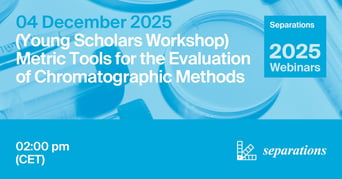- 2.7Impact Factor
- 4.5CiteScore
- 16 daysTime to First Decision
News & Conferences
Latest News & Announcements
Latest Conferences
Propose a Conference Collaboration
Promote and publicise your upcoming conference with MDPI.
All News & Conferences
News & Announcements
Acknowledgment to the Reviewers of Separations in 2025
3 February 2026
News & Announcements
MDPI INSIGHTS: The CEO's Letter #31 - MDPI 30 Years, 500 Journals, UK Summit, Z-Forum Conference, APE
2 February 2026
News & Announcements
Separations | Invitation to Read the Editor’s Choice Articles Published in 2025
29 January 2026
News & Announcements
MDPI’s Newly Launched Journals in December 2025
9 January 2026
News & Announcements
Separations Travel Award—Winner Announced
7 January 2026
News & Announcements
Meet Us at the ACS Spring 2026, 22−26 March 2026, Atlanta, GA, USA
26 December 2025
News & Announcements
Article Layout and Template Revised for Future Volumes
11 December 2025
MDPI Conference
Separations Webinar | (Young Scholars Workshop) Metric Tools for the Evaluation of Chromatographic Methods, 4 December 2025
4 - 4 December 2025
News & Announcements
Separations Webinar | (Young Scholars Workshop) Metric Tools for the Evaluation of Chromatographic Methods, 4 December 2025
27 November 2025
News & Announcements
Meet Us at the 24th Beijing Chromatography Annual Conference, 12 December 2025, Beijing, China
17 November 2025
News & Announcements
MDPI Launches the Michele Parrinello Award for Pioneering Contributions in Computational Physical Science
6 November 2025
of 16










